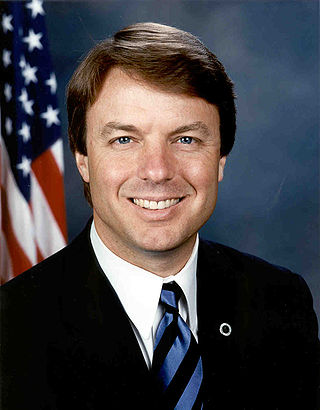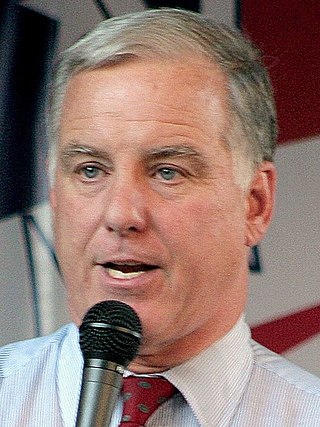
Richard Andrew Gephardt is an American attorney, lobbyist, and politician who represented Missouri's 3rd congressional district in the United States House of Representatives from 1977 to 2005. A member of the Democratic Party, he was House majority leader from 1989 to 1995 and minority leader from 1995 to 2003. He ran unsuccessfully for the Democratic nomination for President of the United States in 1988 and 2004. Gephardt was mentioned as a possible vice presidential nominee in 1988, 1992, 2000, 2004, and 2008.

From January 14 to June 8, 2004, voters of the Democratic Party chose its nominee for president in the 2004 United States presidential election.

The 2004 Iowa Democratic presidential caucuses were an election held on January 19 as part of the United States presidential primary. They were the first major test of some of the leading contenders for the Democratic Party's nomination as its candidate for the 2004 United States presidential election.

Mini-Tuesday was the name given to the February 3, 2004 U.S. presidential primary where several states, which to that point had participated in "Super Tuesday," cast their votes for the Presidential nominees of the 2004 Presidential election. Mini-Tuesday was also called Super Tuesday I. With the large number of states moving their election dates up to Mini-Tuesday for the 2008 election cycle, pundits have largely shied away from using the term again, instead choosing to reappropriate the term "Super Tuesday" to better represent the primaries held on that approximate date. The date is also known as "Super Duper Tuesday," "Giga Tuesday," and "Tsunami Tuesday," among others, with the term "Mini Tuesday" falling to apparent disuse for the time being.
This is a timeline of events during the 2004 U.S. presidential election.
The following is a timeline of major events leading up to and immediately following the United States presidential election of 2008. The election was the 56th quadrennial United States presidential election. It was held on November 4, 2008, but its significant events and background date back to about 2002. The Democratic Party nominee, Senator Barack Obama of Illinois, defeated the Republican Party's nominee, Senator John McCain of Arizona.

The 2004 United States presidential election in South Carolina took place on November 2, 2004, as part of the 2004 United States presidential election which took place throughout all 50 states and D.C. Voters chose eight representatives, or electors to the Electoral College, who voted for president and vice president.

The 2008 South Carolina Democratic presidential primary took place on January 26, 2008. Senator Barack Obama of Illinois won the primary's popular vote by a 28.9% margin.

From January 24 to June 6, 2000, voters of the Democratic Party chose its nominee for president in the 2000 United States presidential election. Incumbent Vice President Al Gore was selected as the nominee through a series of primary elections and caucuses culminating in the 2000 Democratic National Convention held from August 14 to 17, 2000, in Los Angeles, California, but he went on to lose the Electoral College in the general election against Governor George W. Bush held on November 7 of that year, despite winning the popular vote by 0.5%.

The 2004 presidential campaign of John Edwards, U.S. Senator from North Carolina, began on September 16, 2003.

The 2004 presidential campaign of Howard Dean, 79th Governor of Vermont, began when he formed an exploratory committee to evaluate a presidential election campaign on May 31, 2002. Dean then formally announced his intention to compete in the 2004 Democratic primaries to seek the Democratic Party's nomination for President on June 23, 2003. Dean dropped out of the race in February 2004 after a poor showing in the Wisconsin primary.

The 2004 presidential campaign of Dick Gephardt, the Democratic former House Minority Leader and member of the U.S. House of Representatives from Missouri, was formally launched in February 2003. Gephardt had previously ran for the Democratic presidential nomination in 1988, but lost to Mike Dukakis. In 2002, Gephardt resigned as House Minority Leader to focus on his campaign.

The 2004 presidential campaign of Dennis Kucinich, House Representative of Ohio and former mayor of Cleveland, began in February 2003, with a formal announcement made in June. Ralph Nader praised Dennis Kucinich as "a genuine progressive", and most Greens were friendly to Kucinich's campaign, some going so far as to indicate that they would not have run against him had he won the Democratic nomination. However, Kucinich was unable to carry any states in the 2004 Democratic Primaries, and John Kerry eventually won the Democratic nomination at the Democratic National Convention.

The 2004 Oklahoma Democratic presidential primary, part of the process of selecting that party's nominee for President of the United States, took place on February 3, one of the seven nominating contests of 2004's "Mini-Tuesday". The primary election chose 40 pledged delegates to represent Oklahoma at the 2004 Democratic National Convention. The remainder of Oklahoma's 47 delegates consisted of unpledged superdelegates not bound by the results of the primary. The election was a closed primary, meaning that only registered Democrats could vote in this election. Wesley Clark won the primary by a razor-thin margin over John Edwards.

Electoral history of John Edwards, United States Senator from North Carolina (1999-2005), 2004 Democratic Vice Presidential nominee and candidate for Democratic Presidential nomination in 2004 and 2008

The 2008 United States presidential election in South Carolina took place on November 4, 2008, and was part of the 2008 United States presidential election. Voters chose eight representatives, or electors to the Electoral College, who voted for president and vice president.

Howard Dean was a Governor of Vermont, candidate for President of the United States, and Chairman of the Democratic National Committee.
Since 1983, the Democratic Party of the United States holds a few debates between candidates for the Democratic nomination in presidential elections during the primary election season. Unlike debates between party-nominated candidates, which have been organized by the bi-partisan Commission on Presidential Debates since 1988, debates between candidates for party nomination are organized by mass media outlets.
Debates and forums took place between candidates in the campaign for the Democratic Party's nomination for the president of the United States in the 2004 presidential election. The Democratic National Committee sanctioned 6 debates out of 16 total.
This is a list of endorsements for declared candidates in the Democratic primaries for the 2004 United States presidential election.

















